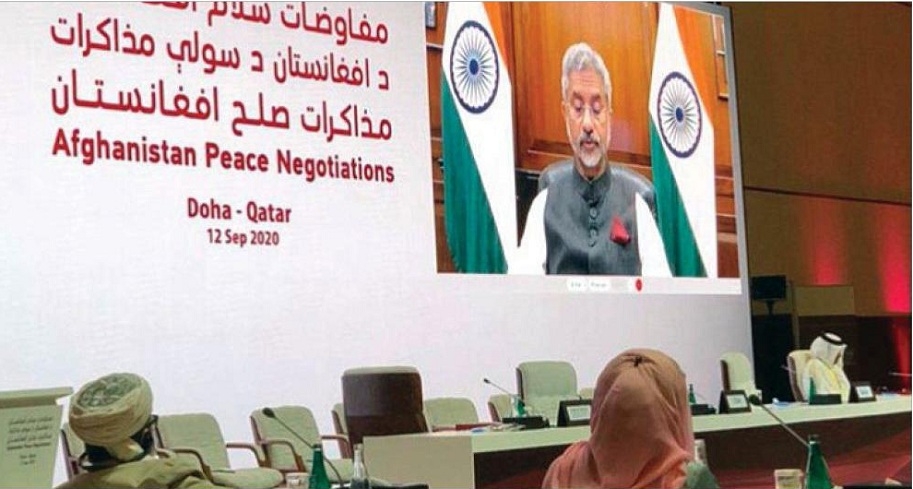INDIA ON THE REVOLVING AFGHAN STAGE
| Date :17-Jan-2021 |

By RAHUL DIXIT :
Escalation of violence in Afghanistan in various forms and through targeted killings has formed the backdrop for second round of peace negotiations between the Afghanistan Government and the Taliban in Doha. The United States special envoy Zalmay Khalilzad is back again at the truce process tasked to him by the outgoing President Donald Trump to seek early withdrawal of American troops from the war-torn country. Khalilzad is expecting tangible progress in the intra-Afghan talks even as the Taliban reaffirms its commitment to the peace agreement. The Afghan theatre has seen it all, and its re-runs over the last few years.

As the theatre readies itself for the final act, it is now time for the actors to get their bearing right without the director’s cue. All these circumstances put into perspective the sudden increase in visits of top Afghan politicians to New Delhi and return calls by Indian officials to Kabul. National Security Advisor Ajit Doval is just back from a two-day visit to Afghanistan. In the last one month, top cadre of Afghan leadership made a beeline to hold high-profile meetings.The names on the guest list themselves are the story of India’s proposed role in Afghanistan’s future. Former Afghan Vice-President Marshal Abdul Rashid Dostum was the first to arrive in New Delhi. He was followed by Chairman of the High Council for National Reconciliation (HCNR) Dr Abdullah Abdullah. And finally General Atta Mohammad Noor, former Mujahideen commander who jumped into a gunfight with terrorists during the 2016 attack on the Indian Mission based in Mazar-e-Sharif, camped in the National Capital. All the visits have come at a crucial time as the State and non-State actors make efforts to end the 19-year-old war.
The Afghans’ hosts included Prime Minister Narendra Modi, External Affairs Minister S Jaishankar, Doval, Foreign Secretary Harshvardhan Shringla and other top politicians. Dostum, an influential warlord, shares a strong relationship with New Delhi which helped it to maintain a sizeable intelligence footprint. Dr Abdullah is seeking India’s key inputs to build a consensus in the peace process under his chairmanship. General Noor finds India as a traditional partner and expects New Delhi to have an engaging role. Keeping the development in the present context, India has started moving the wheels in the right direction for a meaningful role in the post-American troops era in Afghanistan where the Taliban militia are set to become an active part of governance.
A space in the government for Taliban will be a direct advantage to Pakistan which has nurtured the militant group since the 1979 Soviet invasion of Afghanistan for an unending war. India cannot have Pakistan pulling all the strings — political and military — to use the spaces left open after withdrawal of US boots as launch pads for its speciallyformed anti-India ‘Ghazwa-eHind’ battalions. Pakistan is a prominent player in the entire gamut of peace deal. It was instrumental in bringing the Taliban to the negotiations table and earned some brownie points from the US. With the InterService Intelligence (ISI) also playing an active role on the ground, Islamabad’s influence in the USless Afghanistan is set to grow.
This can be extremely counter-productive for Indian interests in the region. India has been a major stakeholder in peace and stability of Afghanistan. It has already invested USD 2 billion in aid and reconstruction activities in the country. It has infrastructural influence across the 34 provinces but that came under the security cover of foreign troops. An uneasy future awaits India as it prepares to safeguard its interests through a delayed but proactive policy shift. India’s best interests lie in the survival and prosperity of A f g h a n i s t a n through its old and trusted allies. Protection of its i n f r a s t r u c t u r e will also require a strategic security measure that can be built only with the help of the regional friends.
These p r o m i n e n t domestic actors also want India to increase its engagement in the country to counter Pakistan’s narrative. In wake of the shifting sands in Afghanistan, India has been dealt an ace in the form of Chairmanship of the Taliban Sanctions Committee of the United Nations Security Council (UNSC) as it begins its eighth term as a non-permanent member at the ‘High Horseshoe Table’. India’s chairing of the committee, apart from two other panels, has come at the most opportune moment when the intra-Afghan talks gain momentum. Among the mandates at its disposal, the Taliban Sanctions Committee has the right to designate and delist individuals deemed a grave threat to peace in the country.
The committee has powers to impose sanctions on such people and entities including freezing of assets and travel ban. If and when, as the chair, India gets a chance to take some strict action it will serve as a reminder to the Taliban leadership about New Delhi’s intentions for the future. The position now gives India an increased importance in the peace talks instead of the observer’s role it chose in the first meeting due to the reluctance to engage with the Taliban. However, there is a catch. The chair of the Taliban Committee does not give India a license to take unilateral steps. Strict guidelines governing the panel’s conduct need the chair to form a consensus among the members over a punitive action before the decision it ratified by the five Permanent Members which includes the always-adamant China. Hammering out a consensus is a mighty exercise full of political compulsions.
Moreover, in the world of diplomacy, truth is not always a matter of fact, it is a matter of consensus. Finding the truth and making the others to see it through India’s lenses will be the real test of Indian diplomacy during the two-year tenure at the UNSC. While subtlety will find its own way on the international platform, there is urgent need to devise potent methods to tackle the ground situation after the busting of a Chinese spy ring in Afghanistan last month. At least 10 Chinese nationals were detained for espionage before highlevel interventions secured their release through a secret arrangement. Some of the spies were learnt to be in contact with the Haqqani Network which enjoys blanket support of Pakistan’s ISI.
Another possibility of the Chinese presence in Afghanistan is the Jinping Government’s concern over the volatile Xinjiang province where the Uyghur Muslims are subjected to inhuman treatment in government-run detention centres. Xinjiang province shares its borders with Afghanistan and the Chinese always see the border region as a breeding ground for Uyghur Muslim militants. With the rising number of players in the theatre, each catering to their own interests, India has no option than to make a grand entry on the revolving Afghan stage with a clear script.The stakes in Afghanistan are too big to be given away. ■